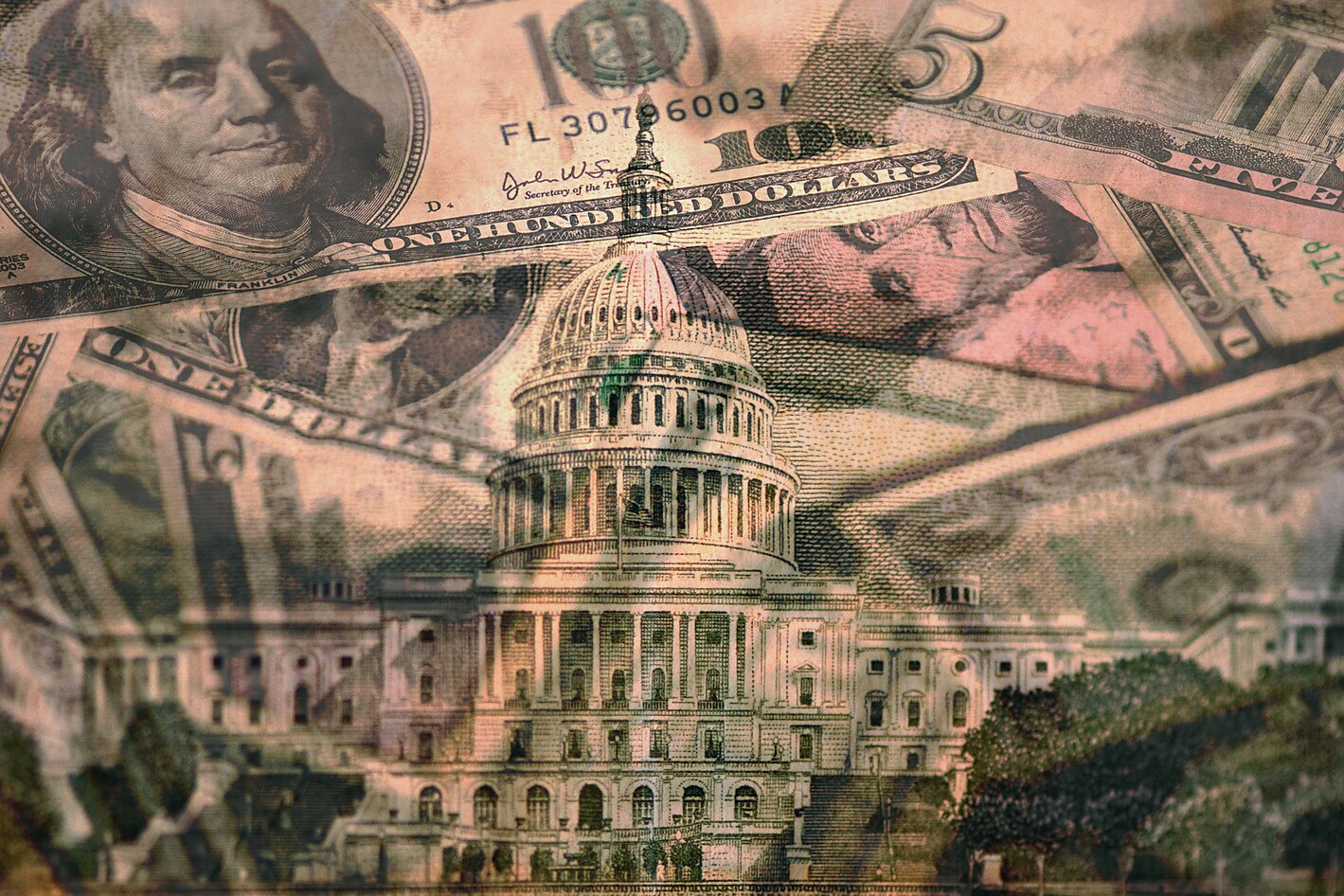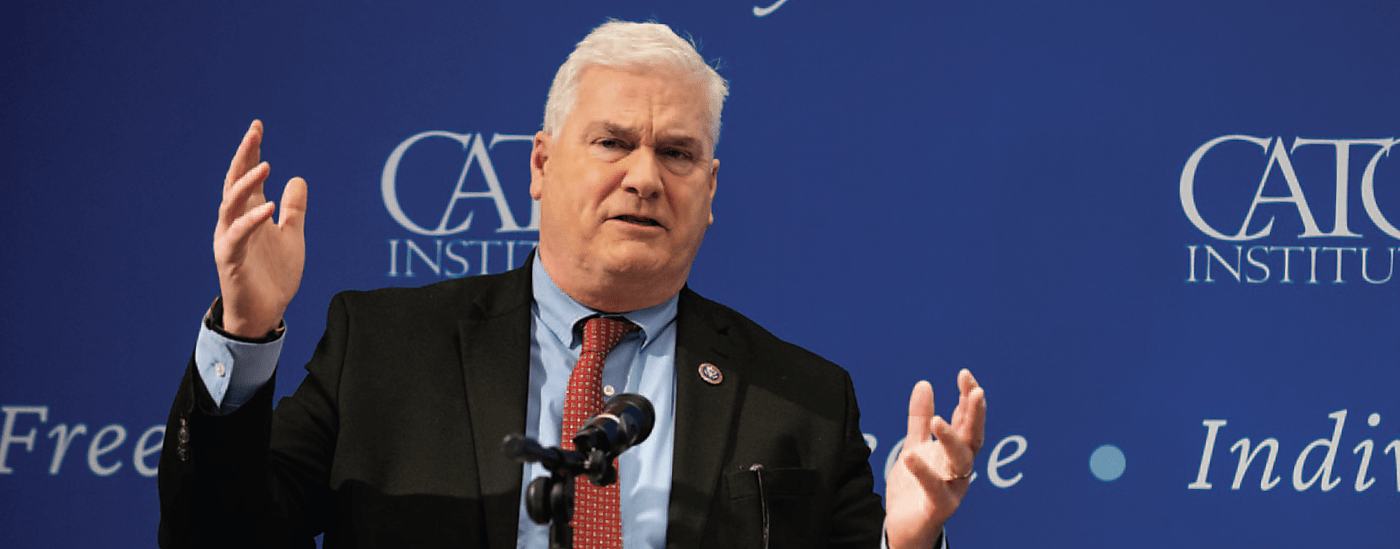Romina Boccia, director of budget and entitlement policy, has won support from policymakers and the media for her innovative proposal to get the federal budget under control by establishing a bipartisan commission to cut spending and reduce debt to below 100 percent of GDP.
Promoting Fiscal and Regulatory Restraint
America’s national debt now exceeds $34 trillion and counting—but that’s just the tip of the iceberg. Soon, entitlement programs, notably Social Security and Medicare, will add trillions more to the debt. By 2053, debt is projected to reach 181 percent of gross domestic product (GDP), and that’s under rosy economic assumptions. There’s no doubt a fiscal crisis is on the horizon—the only question is how close it is.
Congress’s failure to act is threatening America’s economic stability and promises to bury our children and grandchildren under a mountain of debt. Through original research, articles, media appearances, testimony, and engagement with policymakers, Cato scholars are making it clear that reform is not an option; it is a necessity.
Budget Breakthrough: Federal Spending Reform Proposal Wins Support
To ensure results, Boccia says a commission should have its recommendations be “self-executing upon presidential approval” unless Congress passes a joint resolution disapproving of the reform package. This would provide political cover for members of Congress to approve the necessary changes sooner.
Her proposal is broadly praised by budgetary experts because it is modeled after a tried-and-true method for enacting spending cuts: the Base Realignment and Closure (BRAC) commission that closed needless military bases in the aftermath of the Cold War. Her efforts have led former Bureau of Labor Statistics commissioner Bill Beach to dub Boccia the “guru of the fiscal commission.”
A Great Idea Gains Traction
Boccia cultivated support for her ideas through media appearances and engagement with policymakers, including frequent meetings with members of the Problem Solvers Caucus and Bipartisan Fiscal Forum. Meanwhile, then House Speaker Kevin McCarthy echoed Boccia’s prescriptions on Fox News, and Pulitzer Prize–winning journalist George Will featured her proposal in a Washington Post column.
Boccia further clarified the structure of her proposed commission at a November hearing before the House Budget Committee. Her testimony inspired a flurry of activity on the Hill—including engagement with former Sen. Rob Portman, who extolled the BRAC commission as a successful model for producing an effective fiscal commission.
Her reform ideas are now at the forefront of the national conversation. In January, the House Budget Committee passed the Fiscal Commission Act of 2024, which was introduced by members of the Bipartisan Fiscal Forum. Despite the bill’s shortcomings, it incorporates aspects of Boccia’s proposal and represents a notable step forward.
Following the bill’s passing, in March 2024, Boccia testified on America’s fiscal situation before the Joint Economic Committee. During the hearing, Rep. David Schweikert (R‑AZ) referred to Boccia as “one of the few voices out there that’s been saying that the debt and deficit commission is an opportunity for us to at least have some commonality.”
Auditing the IRS
The Biden administration is planning to double the IRS budget and increase aggressive enforcement. Chris Edwards, Cato’s Kilts Family Chair in Fiscal Studies, was invited to testify in 2023 before both the Senate Budget Committee and Senate Finance Committee regarding the IRS and tax enforcement issues. Edwards’s testimony pointed to the serious downsides of aggressive enforcement and demonstrated that the United States already has a higher compliance rate than most other countries. He also noted that high earners make smaller errors on their tax returns than lower earners and that for cases that go to court the IRS often loses.
Promoting Fiscal Sanity
In a series of articles and reports, Edwards urged Congress to cut low-value federal programs. With Congress to soon consider major farm and food stamp bills, Edwards published studies revealing the large amount of waste in both programs. He then presented his reform ideas to dozens of key House and Senate staffers in two major forums on Capitol Hill.
And as lawmakers geared up to either extend the Trump tax cuts or let them expire, Edwards published a major study on tax reform urging Congress to repeal narrow breaks and loopholes.
Talking Truth about Taxes
The 2017 Tax Cuts and Jobs Act was the most significant reform to the US tax code in 30 years, but it expires in a few short years. Adam Michel, Cato director of tax policy studies, testified in May for the Senate Budget Committee. Michel’s testimony highlighted three main points: (1) the 2017 tax cuts put money back into Americans’ pockets, supported domestic investment, and boosted economic growth; (2) the federal budget deficit is not primarily caused by tax cuts but by unsustainable spending growth; and (3) if Congress decides that current spending programs don’t need to be cut, it should be honest with the American people that with big government comes higher taxes on everyone, not just the rich.
For Affordable Housing, Less Government
Policy mistakes fueling the inflation of house prices—including zoning regulations that restrict supply while a variety of government programs subsidize housing demand—have created an acute affordability challenge for American families. Testifying before the Senate Finance Committee in March, Cato senior advisor and former Federal Housing Finance Agency head Mark Calabria reminded lawmakers of the importance of pro-growth policies that allow job and income growth. Broad-based economic growth, engendered by less government intervention, is a powerful force for housing affordability.
Revealing the True Causes of Inflation
In an attempt to let reckless fiscal and monetary policy off the hook, pundits and policymakers attempt to fool the public by blaming inflation on dubious factors such as “corporate greed.” Cato’s deep roster of economic scholars—including Ryan Bourne, R. Evan Scharf Chair for the Public Understanding of Economics; Scott Lincicome, vice president of general economics and the Herbert A. Stiefel Center for Trade Policy Studies; and Norbert Michel, vice president and director of the Center for Monetary and Financial Alternatives (CMFA)—were regularly featured in the media debunking these ideas.
Bourne’s weekly column in The Times (UK) and his Substack newsletter, The War on Prices, remind readers of inflation’s monetary origins and the destructiveness of price and wage controls, which are becoming increasingly popular as a response to concerns about living costs. Lincicome is a regular guest on CNBC programs (among others), and Michel is a weekly columnist in Forbes, where they both set the record straight on inflation.
Defending Financial Privacy
Financial privacy—including the right to transact with whom we wish—is fundamental to a free and open society. Most Americans can’t imagine the government poking its nose into their bank statements, dictating what kinds of purchases are acceptable, or preventing access to their own hard-earned dollars. That’s precisely what’s at stake as key voices around the world and across the political spectrum lay the groundwork for a central bank digital currency (CBDC), which threatens to strip away our financial privacy, security, and Fourth Amendment rights.
Scholars from Cato’s Center for Monetary and Financial Alternatives (CMFA) met with House majority whip Tom Emmer (R‑TN) to discuss his pioneering work to prevent a central bank digital currency (CBDC). The updated legislation he subsequently introduced provides additional protections designed to prevent the Federal Reserve from issuing a retail CBDC, echoing policy solutions in the CMFA’s research. In March, Rep. Emmer gave the opening address at Cato’s policy forum on CBDCs, where he stated that “it is more important than ever that the United States’ digital currency policy upholds our American values of privacy, individual sovereignty, and free-market competitiveness.”
CBDCs would “most likely be the single largest assault to financial privacy since the creation of the Bank Secrecy Act in 1970 and the establishment of the third-party doctrine,” according to Michel and Nicholas Anthony, a CMFA policy analyst.
Cato’s economic scholars, including those in the CMFA, are creatively and forcefully meeting this moment in American history by advocating a modern application of the principles of the American Founding: our fundamental rights of property, privacy, and speech.
Cato in the Vanguard
Norbert Michel was one of the first think tank scholars to oppose CBDCs. In April, Michel and Anthony published an interactive study, “The Risks of CBDCs: Why Central Bank Digital Currencies Shouldn’t Be Adopted,” and released polling showing that only 16 percent of Americans would support adopting a CBDC. Along with the study, their policy analysis included the first comprehensive legislative framework to prohibit the Federal Reserve and Treasury from issuing a CBDC in any form.
Looping in Lawmakers
Michel was invited to testify on the dangers of CBDCs before the House Committee on Financial Services. He emphasized the serious risk that CBDCs pose to financial privacy, freedom, markets, and cybersecurity. Michel’s testimony facilitated greater engagement and was shared by policymakers, including Rep. Warren Davidson (R‑OH).

In September, Norbert Michel, vice president and director of the CMFA, was invited to testify before Congress on the dangers of a central bank digital currency, which poses serious risks to Americans’ financial privacy, freedom, markets, and cybersecurity.

CMFA scholars met with Rep. John Rose (R‑TN) to discuss Bank Secrecy Act reforms. Soon afterward, Rep. Rose announced his new bill at Cato’s February event on the Bank Secrecy Act hosted by Fox News’s Kat Timpf. The bill would strengthen personal and monetary freedom, reflecting policy prescriptions from Cato’s research.
In March, Cato held a policy forum, “Exploring the Risks of Central Bank Digital Currencies,” featuring an opening address from Rep. Tom Emmer (R‑MN). As the first member of Congress to introduce legislation prohibiting the Fed from launching a retail CBDC, Emmer echoed the same warnings Cato has articulated from the beginning: CBDCs directly threaten vital American values, including privacy, individual sovereignty, and free markets. That same month, Sen. Mike Lee (R‑UT) directly quoted Anthony and Michel in the introduction of his No CBDC Act.
At another Cato event, Rep. John Rose (R‑TN) discussed his introduction of the Bank Privacy Reform Act, a bill that would prevent the government from accessing consumers’ transaction history without first obtaining a warrant, thus reaffirming the Fourth Amendment protections against unreasonable searches and seizures. From privacy laws to crypto regulations to Securities and Exchange Commission enforcement, Cato’s scholars equip citizens and policymakers with the knowledge to defend our rights against fundamental threats to Americans’ financial privacy and freedom.
A Free-Market Vision for Energy Policy
Abundant energy is vital to economic growth and human progress. As policymakers propose sweeping energy regulations and trillions of dollars’ worth of subsidies and our power grid struggles to keep up with modern demands, the stakes are high. There must be more libertarian voices making the case for the role of free markets in improving the availability and affordability of energy and natural resources.
In 2023, we leveraged Cato Sponsors’ support to recruit Travis Fisher as our new director of energy and environmental policy studies, bolstering our research on this crucial topic. Fisher, who has already testified three times at the federal level since joining Cato, will be a leading voice making the case that we should embrace American values and foster an energy industry that is built on fierce competition to best serve the interests of consumers.

